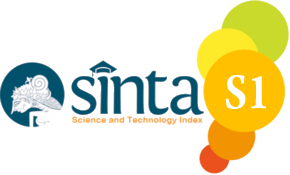PEMBAHARUAN HUKUM ISLAM DI INDONESIA DAN TOKOH-TOKOHNYA
Abstract
The emergence of new problems or problems in the community that really need legal clarity, all of which have not been answered in either the Qur'an or the Hadith, in connection with the cessation of revelation and the death of the Prophet Muhammad who acted as a mediator between revelation and the reality that lived at that time. The renewal of Islamic law is the solution, the purpose of this paper is to find out the concepts of Islamic law reform and figures who contribute to the renewal of Islamic law. The type of research is descriptive qualitative with library research, namely research that is directed and focused on the study and discussion of library materials that have to do with the problem being studied, Overall, the renewal of Islamic law in Indonesia runs rather slowly compared to other Muslim countries, especially in the Middle East, North Africa, India and Pakistan. However, the realization of the marriage law number 1 of 1974, government regulation number 9 in 1975, Government regulation number 10 of 1983, government regulation number 28 of 1977 concerning the ownership of land, and the realization of the compilation of Indonesian Islamic law in 1991 were the dynamics of renewal of Islamic legal thinking that must be grateful, as for the characters and the ideas are: 1) Hasbi Ash-Shiddieqy (Indonesian Jurisprudence); 2) Hazairin: Indonesian National School; 3) Munawir Syadzali: Reactualization of Islamic Law; 4) Ibrahim Hosen: Making Nash Qat'i fun; 5) Ali Yafie and Sahal Mahfuz: Social Jurisprudence.
Keywords
Full Text:
PDFReferences
A. Athaillah, Mengenal Ulum Al-lqur’an, Makalah, Program Pascasarjana IAIN Antasari Banjarmasin, 2005.
Abdul Azis Dahlan, Ensiklopedi Hukum Islam, Jilid VI, Cet. I, Jakarta: Ichtiar Baru Van Hoeve, 1996
Abdul Manan, Reformasi Hukum Islam di Indonesia, Jakarta: Raja Grafindo Persada, 2006
Abdullah syafi’ie, Pembaharuan Hukum di Indonesia: Tradisi Keislaman dan Keindonesiaan, (Catatan Pinggir Diskusi Dosen 10 Oktober 2013)
Abu al-Hasan al-Mawardi, al-Ahkam al-Sulthaniyah, Beirut: Dar al-Fikr, tt
Abu Yasid, Nalar dan Wahyu; Interrelasi dalam Proses Pembentukan Syari’ah, (selanjutnya disebut Nalar), Jakarta - Erlangga, 2007
Ahmad Azhar Basyir, Refleksi Atas Persoalan Keislaman : Seputar Filsafat, Hukum, Politik dan Ekonomi, Cet. II, Bandung: Mizan, 1994
Ahmad Rofiq, Hukum Islam di Indonesia, Jakarta; Grafindo Persada, 1995
Amir Syarifuddin, Ushul Fiqh, Ciputat: Logos Wacana Ilmu, 1997
Bagir Manan, Peranan Peradilan Agama dalam Pembinaan Hukum Nasional, Bandung:Rosda Karya, 1991
Hazairin, Hukum Kewarisan Bilateral Menurut AL-Qur’an dan Hadits, Jakarta: Tintamas, 1982
Ibrahim Hosen, “Memecahkan Permasalahan Hukum Baru” dalam Ijtihad dalamSorotan Cet. IV, Bandung: Mizan, 1996
Ibrahim Hosen, “Menyongsong Abad ke21: Dapatkah Hukum Islam Direkaktualisasikan? Dalam Mimbar Hukum: Aktualisasi Hukum Islam, No. 12 Tahun V, 1994
Imam Syaukani, Rekonstruksi Epistemologi Hukum Islam Indonesia, Ed. I, Cet. I, Jakarta: Raja Grafindo Persada, 2006
M. D. J. Al-Barry dan Sofyan Hadi A. T., Kamus Ilmiah Kontemporer, Cet. I, Bandung: Pustaka Setia, 2000.
Mahadi, Hukum Waris Bagi Umat Islam, Jakarta: Proyek Peningkatan Badan Pembinaan Peradilan Agama, 1980.
Mahsun Fuad, Hukum Islam di Indonesia: Dari Nalar Partisipatoris Hingga Emansipatoris, Cet. I, Yogyakarta: Lkis, 2005
Mohammad Daud Ali, Hukum Islam : Pengantar Ilmu Hukum dan Tata Hukum Islam di Indonesia, Ed. VI, Cet. VIII, Jakarta: Raja Grafindo Persada, 2000.
Muhammad Wahyu Nafis dkk (Ed. ), Kontekstualisasi Ajaran Islam: 70 Tahun Prof. Dr. Munawir Syadzali, MA, Cet. I, Jakarta: Paramadina, 1995.
Nouruzzaman Shiddiqi, Fiqh Indonesia: Penggagas dan Gagasannya, Cet. I, Yogyakarta: Pustaka Pelajar, 1997.
Sahal Mahfuz, “Islam dan Hak Reproduksi Perempuan: Perspektif Fikih” dalam Syafiq Hasyim (Edit.), Menakar “Harga” Perempuan, Cet. I, Bandung: Mizan, 1999.
Sahal Mahfuz, Nuansa Fikih Sosial, Cet. I, Yogyakarta: LkiS, 1994.
Thahir Mahmood, Family Law Reform in The Muslim World, Bombay: N. M. Tripathi, 1972.
Zainal Abidin Abubakar, Kumpulan Peraturan Perundang-undangan dalam Lingkungan Peradilan Agama, Cet. III, Jakarta: Raja Grafindo Persada, 19995.
DOI: http://dx.doi.org/10.22373/jiif.v19i2.4414
Refbacks
- PEMBAHARUAN HUKUM ISLAM DI INDONESIA DAN TOKOH-TOKOHNYA
- PEMBAHARUAN HUKUM ISLAM DI INDONESIA DAN TOKOH-TOKOHNYA
- PEMBAHARUAN HUKUM ISLAM DI INDONESIA DAN TOKOH-TOKOHNYA
- PEMBAHARUAN HUKUM ISLAM DI INDONESIA DAN TOKOH-TOKOHNYA
- PEMBAHARUAN HUKUM ISLAM DI INDONESIA DAN TOKOH-TOKOHNYA
- PEMBAHARUAN HUKUM ISLAM DI INDONESIA DAN TOKOH-TOKOHNYA
- PEMBAHARUAN HUKUM ISLAM DI INDONESIA DAN TOKOH-TOKOHNYA
- PEMBAHARUAN HUKUM ISLAM DI INDONESIA DAN TOKOH-TOKOHNYA
- PEMBAHARUAN HUKUM ISLAM DI INDONESIA DAN TOKOH-TOKOHNYA
Welcome to Jurnal Ilmiah Islam Futura (JIIF) open journal system. Thank you very much for visiting. We are looking forward to getting your research articles
Jurnal Ilmiah Islam Futura
All works are licensed under CC-BY
©Published by Center for Research and Community Service (LP2M) in cooperation with the Postgraduate Program of UIN Ar-Raniry Banda Aceh, Aceh, Indonesia.





